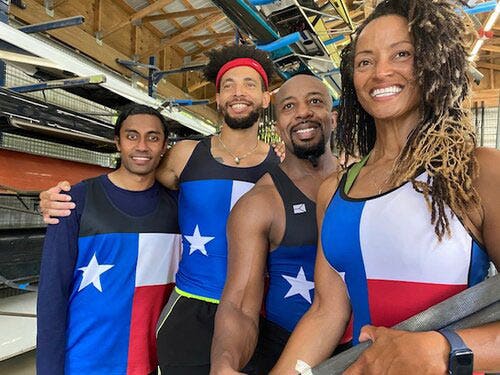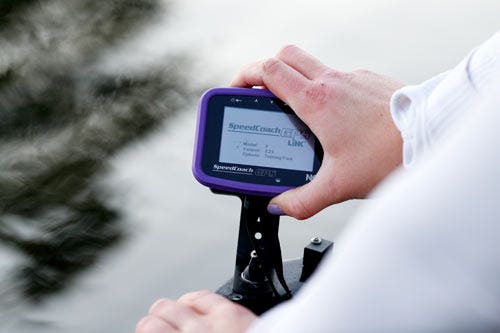Got a need for speed and savings? Take 15% off the SpeedCoach for a limited time!
What Makes Coaching Masters Rowers Different

Coaching masters rowers means explaining the why of everything, addressing a wide diversity of goals, working with bodies as they are, and finding great joy for both coach and rowers.
"He learned to row at 70 years old!" Magda Vidal of Pocock Rowing Center in Seattle exclaims. What impressed her, even more, was that he consistently showed up to row twice a week for two years. "He was relentless about learning." Watching athletes learn and gain confidence gives her the greatest satisfaction coaching masters rowers.
We connected with nine coaches across the USA, all with years of experience coaching masters rowers. Some also coached younger rowers at clubs, high school or collegiate level, so they can pinpoint what makes coaching masters different. Quite a lot it turns out. Sara Gronewold, Director of Craftsbury Sculling Center, says that their July and August camps are always a mix of masters and junior rowers, making it challenging for their coaches because of those differences.
On Attitude and the Why
Adult rowers are paying to be coached, whether through club fees or for private lessons, points out Tara Morgan, Co-founder of Steady State Network. They show up because they want to master their sport. They have intention. A coach is less of an authority figure than they would be with juniors and more of a partner in the adult rower's progress. Some younger and/or high-performance coaches might have a bit of a cavalier attitude toward masters. "You are not coaching your mom," admonishes Tara. Mutual respect is key.
When coaching masters rowers, all the coaches agreed that the rowers want to understand the why of pretty much everything. Perhaps rowers tend to have type A personalities, or maybe it is because they are coming to the sport after decades of life experience. "And quite a few know physics and medicine, so it challenges me to really understand what I'm teaching," laughs Karen Sommer, also of Pocock. Different coaches bring different approaches to answer the why. For Rachel Freedman, a co-founder of Steady State Network, answering the why is a multi-step process. She begins by telling the rowers what they are going to do, takes questions, explains the why then circles back with feedback and more why after the drill or workout.
Lisa Schlenker, who coaches at Craftsbury, takes a totally different approach. She does not explain the why when describing a drill. She just gives very clear and precise instructions. Afterward she asks the rowers what they got from the exercise. They figure out the why themselves and learn even more when they hear from the other rowers in the group, each of whom expresses the learning differently.

Photo credit: Tracy Falkenthal
Lisa also found that not only do masters rowers need to understand, but their life experiences also opens up more ways to explain the why. For example, a common coaching instruction might be "left over right" for sculling. At Craftsbury, it is more "left in front of right," the hands nesting. So when Lisa tells her masters rowers to let their hands be married rather than divorced, they get it.
Progress takes time and that's okay
Despite a positive attitude and a strong intent to understand and learn, improving technique, gaining fitness and making the boat move better can take longer. New personal bests look different for an adult returning to rowing later in life and who was competitive as a youth. Nevertheless, many masters rowers take up the sport in their 50's, 60's or older. They get better and better, albeit slowly. Tracy Falkenthal of Texas Rowing Center wonders if some find it harder to let go of ingrained bad habits. Even when they understand why they should change.
There was universal agreement about the need to celebrate small wins. Tara calls it hugs and high-fives. Coaches are always looking for what needs to be fixed, but positive feedback is equally important when coaching masters rowers. Iva Boteva of iRow Fitness Studio in Los Angeles recounts how simple praise after a drill prompted one client to say "Wow, I don't remember the last time I got a compliment." Of course, he was talking about his life, not just rowing. "And adults are not all used to learning a new skill so they may tend to be impatient and frustrated at not being good right away," points out Ellen Braithwaite, a coach at Craftsbury.
Some masters rowers have never been coached in a sport before, don't view themselves as athletes and are not used to taking instruction. Understanding a person's life experience is invaluable for a masters coach. As Ellen indicates "I try to build on what people already know about using their bodies because skills are transferrable. If you are a tennis player, or a golfer, you know how to have a loose grip. One new sculler I worked with said he was a calligrapher in the Persian language, so I was able to ask him how he held his pens and brushes and applied the ink."

Physiology and mindset are key factors
Rowing is a dynamic sport demanding balance, agility, coordination, power, and endurance. An older body does not behave or respond like a younger body. Masters rowers come in all shapes and sizes with vastly different levels of fitness, strength, flexibility and coordination. Some have what Iva jokingly refers to as body deficits. For example, she has coached a client with fused ankle with a metal plate or another who was in line for a hip replacement in two months. As she puts it, everyone has a row with the body that they have now. Sara emphasized that coaching masters rowers require paying attention to the type of work being asked of the athletes and ensuring adequate recovery.
Mindset is also critical. "I feel like the athlete that is going to learn the fastest and be able to make changes to their technique more easily are those that are less anxious/fearful, and don't have a fixed mindset," says Karen. Ellen points out that when coaching masters rowers, "the first step is often getting people to relax enough to have an open mind. "Lisa agrees. While body mechanics are fundamental for adult rowers, there needs to be an awareness between the body and the mind.
Diversity of goals
Adults learn to row and continue to learn the sport for many reasons. This differs from younger rowers, who almost uniformly want to secure a seat in the top crew, and go to regattas to race and win medals. Some masters rowers are competitive and want to get faster, race, and win. Others might want to improve their fitness. For some, the social aspect is paramount. One rower went to Craftsbury to learn to row quietly – she was a birdwatcher.
Understanding motivations is essential. Universally, our coaches spoke of the importance of asking masters what their goals are, sometimes asking repeatedly and listening carefully to the answers. Adult rowers have busy lives outside of rowing, which may inform a rower's motivation. Careful listening is also part of coaching each session. Lisa pays attention to how her scullers express what they are learning or feeling. Sometimes she needs to change her language to convey a concept or provide direction. "There is not one way of speaking to people." Offering empathy and support can be as important as technical detail.
Goals can evolve. Tracy tells the story of a client who started rowing to lose weight. When she began working with Tracy, she was not interested in technique nor racing, just wanting the pounds off. A few years on, that client is in a racing single, with the weight loss goal achieved. Tracy says that there are many different ways to measure progress, just as there are many different goals. Magda emphasizes the importance of defining success not based on how you do relative to others but on your own experiences and your goals. Which might be as simple as ensuring three rows a week or getting comfortable in a single.
Tailoring a plan or a workout to individual goals is easiest with private lessons but is still possible in a group session. Magda pairs up rowers with similar motivations when on the water. Both Rachel and Iva provide personalized feedback, not broad instructions to the whole boat or the group. It seems that masters coaches need to draw upon their own life experiences to respond. Bobbi Kizer from Spokane River Rowing Association points out that Level 2 coaching training is oriented to competitive rowing. When Bobbi took their certification, only 3 or 4 of their cohort of about 40 coaches were from community clubs. They had to specifically ask how certain bits of material might be applied to a community team.
Peer-coaching and self-coaching
A survey of about 600 masters rowers in 2022 found that over half did not get any or only infrequent coaching. However, the absence of a coach does not mean the absence of a desire to learn. Our Top 10 Resources for Masters Rowers has suggestions which might help a rower self or peer coach. The top resource is Master Rowing, a book by Volker Nolte, the man who can make serious training seriously fun.
When asked about peer or self-coaching, the nine coaches responded with video, video, video. There can be a huge difference between what we think we are doing and what we are actually doing. Other tips include:
- Participate in "Rolodex clubs" --Tracy
- Also, check our recommendation for the best multinational rowing club on the Masters Resources post!
- Go to a camp -- Karen
- Periodically go to another club for a row or reach out to a coach you admire. Send a video and ask for feedback -- Tara
- Find someone to hold you accountable. Make a plan to meet an identified goal. Be clear about why you are rowing -- Magda
- Listen to your fellow rowers, "Their advice might not always be the most technical, and is also biased by their own technique, but it helps build the skills of adaptability, empathy, and teamwork," -- Bobbi
- "For self-coaching, don't be too ambitious and do stay positive. … Just sit in the boat and be there. Be mindful and present. Make yourself a part of the world" -- Ellen
Coaching masters rowers is a joy
It is seeing the lightbulb moment when the eyes brighten and the rower exclaims, "Oh, I got it!" Coaching masters rowers might be different and have different challenges, but the coaches we spoke with love it. For Iva, a successful lesson is when a rower feels better at the end than at the start. Clients become long-term friends and sometimes role models for the coach. Thinking back to her 70-year-old athlete, Magda says that she values creating an atmosphere where everyone feels invited to challenge themselves while not required to meet a particular performance standard. As a result, there are a lot of masters rowers and coaches doing what they love and doing it well.
The contributors
- Iva Boteva, iRow Fitness Studio
- Ellen Braithwaite, Craftsbury Sculling Center
- Tracy Falkenthal, Texas Rowing Center
- Rachel Freedman, Steady State Network
- Sara Gronewold, Craftsbury Sculling Center
- Bobbi Kizer, Spokane River Rowing Association
- Tara Morgan, Steady State Network
- Lisa Schlenker, Craftsbury Sculling Center
- Karen Sommer, Pocock Rowing Club
- Magda Vidal, Pocock Rowing Center





